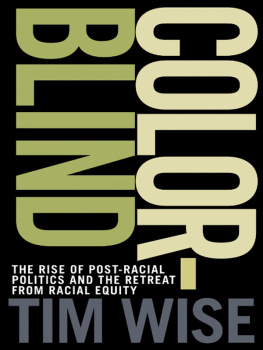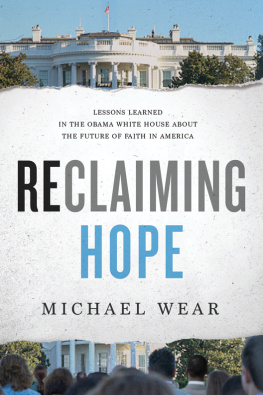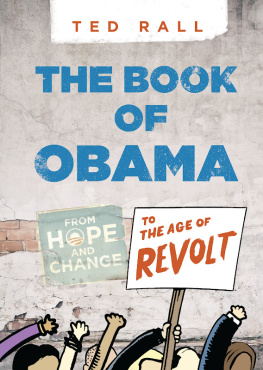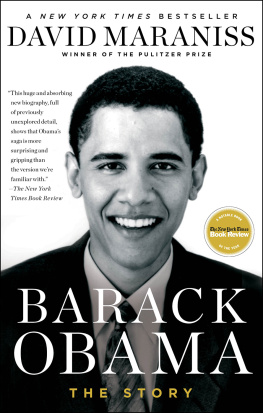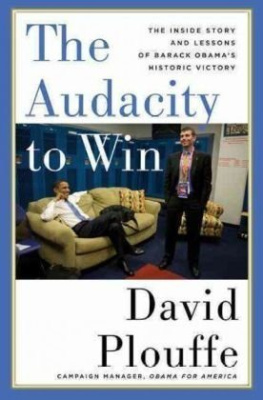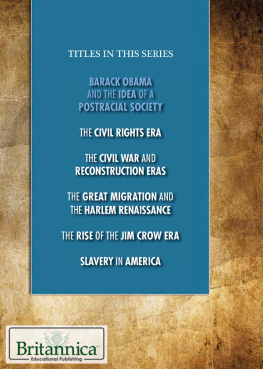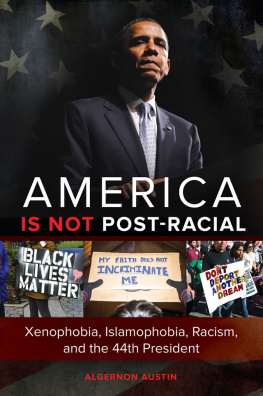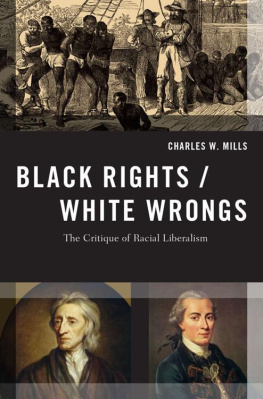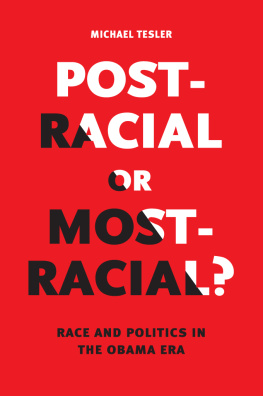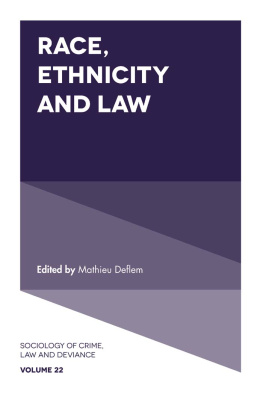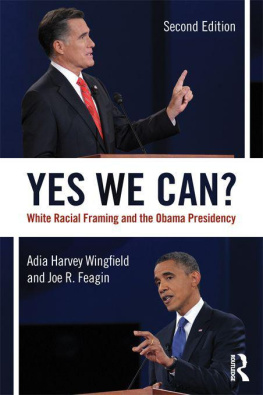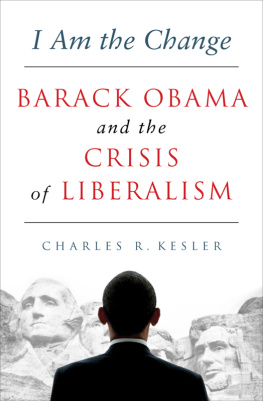PRAISE FOR
COLORBLIND: THE RISE OF POST-RACIAL POLITICS AND THE RETREAT FROM RACIAL EQUITY
With Colorblind, Tim Wise offers a gutsy call to arms. Rather than play nice and reiterate the fiction of black racial transcendence, Wise takes the gloves off: He insists white Americans themselves must be at the forefront of the policy shifts necessary to correct our nations racial imbalances in crime, health, wealth, education and more. A piercing, passionate and illuminating critique of the post-racial moment.
Bakari Kitwana, author of The Hip-Hop Generation: Young Blacks and the Crisis in African American Culture
Tim Wises Colorblind brilliantly challenges the idea that the election of Obama has ushered in a post-racial era. In clear, engaging, and accessible prose, Wise explains that ignoring problems does not make them go away, that race-bound problems require race-conscious remedies. Perhaps most important, Colorblind proposes practical solutions to our problems and promotes new ways of thinking that encourage us to both recognize differences and to transcend them.
George Lipsitz, author of The Possessive Investment in Whiteness
At every turn and every corner, in every crevice and every crack, Tim Wise debunks the mythology of a color blind society with the vigor of a statistician and the passion befitting one of the preeminent anti-racist theorists working today. You will literally lose your breath trying to keep up with the ways that Wise lays waste to the idea that weve achieved anything close to a post-race society. If you dont know who Tim Wise is, you will after this book.
Mark Anthony Neal, author of New Black Man and Professor of African & African-American Studies at Duke University
PRAISE FOR
BETWEEN BARACK AND A HARD PLACE
Wises short book reads like an old-school polemic: Thomas Paines Common Sense for the 21st century . A post-racial United States is an imagined country.
Washington Post
Wise, a white anti-racism activist and scholar (and author of White Like Me), pushes plenty of buttons in this methodical breakdown of racisms place in the wake of Barack Obamas victory . Theres no sugar coating here for whites, nor are there any news flashes for Americans of color, but Wise bravely enumerates the unpalatable truths of a nation still struggling to understand its legacy of racist oppression.
Publishers Weekly
Wise outlines how racism and white privilege have morphed to fit the modern social landscape. In prose that reads like his lightning-rod speeches, he draws from a long list of high-profile campaign examples to define what he calls Racism 2.0, a more insidious form of racism that actually allows for and celebrates the achievements of individual people of color because theyre seen as the exceptions, not the rules.
Colorlines
This book makes an intriguing argument and is packed with insight. Wise clearly explains the complexity of institutional racism in contemporary society. He continuously reminds the reader that Obamas victory may signal the entrenchment of a more complicated, subtle, and insidious form of racism. The jury is still out.
Multicultural Review
Tim Wise has looked behind the curtain. In Between Barack and a Hard Place he explores the real issues of race in the Obama campaign and incoming presidency, issues that the mainstream media has chosen to ignore. His book debunks any notion that the United States has entered a post-racial period; instead he identifies the problems that emerge in the context of the victory of a black presidential candidate who chose to run an essentially non-racial campaign. With this book, Wise hits the bulls-eye.
Bill Fletcher, Jr., Executive Editor of
BlackCommentator.com and co-founder of the Center for Labor Renewal
PRAISE FOR TIM WISE
Tim Wise is one of the most brilliant, articulate and courageous critics of white privilege in the nation. His considerable rhetorical skills, his fluid literary gifts and his relentless search for the truth make him a critical ally in the fight against racism and a true soldier in the war for social justice. His writing and thinking constitute a bulwark of common sense, and uncommon wisdom, on the subject of race, politics and culture. He is a national treasure.
Michael Eric Dyson, University Professor,
Georgetown University
(Wises) work is revolutionary, and those who react negatively are simply afraid of hearing the truth .
Robin D.G. Kelley, Professor of History, University of Southern California
Tim Wise is one of those rare public intellectuals that numerous authors have suggested are becoming extinct in this society. He is evidence that this is not the case . In my judgment, he is the very best of the white anti-racism writers and commentators working in the U.S. media today .
Joe Feagin, Graduate Research Professor of Sociology, Texas A&M
One of the brilliant voices of our time.
Molefi Kete Asante, Professor of African American Studies, Temple University
Wise is the nations leading antiracist author/activist .
David Naguib Pellow, professor of Ethnic Studies, University of Minnesota
(His) is the clearest thinking on race Ive seen in a long while written by a white writer right up there with the likes of historians Howard Zinn and Herb Aptheker as far as Im concerned.
Dr. Joyce King, Benjamin E. Mays Endowed Chair for Urban Teaching, Learning and Leadership, Georgia State University
OTHER BOOKS BY TIM WISE
Between Barack and a Hard Place: Racism
and White Denial in the Age of Obama
(Open Media Series / City Lights Books, 2009)
Speaking Treason Fluently: Anti-Racist Reflections
from an Angry White Male
(Soft Skull Press, 2008)
White Like Me: Reflections on Race from a Privileged Son
(Soft Skull Press, 2005, revised, 2008)
Affirmative Action: Racial Preference in Black and White
(Routledge, 2005)
COLORBLIND
The Rise of Post-Racial Politics and the Retreat from Racial Equity
Tim Wise

CITY LIGHTS BOOKS / OPEN MEDIA SERIES
San Francisco
Copyright 2010 by Tim Wise
All Rights Reserved.
The Open Media Series is edited by Greg Ruggiero and archived by the Tamiment Library, New York University.
Cover design: Pollen
Library of Congress Cataloging-in-Publication Data Wise, Tim J.
Colorblind : the rise of post-racial politics and the retreat from racial equity / Tim Wise.
p. cm. (Open media series)
Includes bibliographical references.
ISBN 978-0-87286-508-2
1. United StatesRace relations. 2. United StatesRace relationsPolitical aspects. 3. RacismPolitical aspectsUnited States. 4. LiberalismUnited States. 5. African AmericansCivil rightsHistory20th century. I. Title. II. Series.
E185.615.W557 2010
305.800973dc22
2010006545
City Lights Books are published at City Lights Bookstore
261 Columbus Avenue, San Francisco, CA 94133
www.citylights.com
Preface
Theres not a liberal America and a conservative America; theres the United States of America. Theres not a black America and a white America and Latino America and Asian America; theres the United States of America.
With these words, delivered as part of his first speech to a national audience, thenIllinois state senator Barack Obama elicited uproarious applause from those assembled in Boston for the 2004 Democratic National Convention. As political theater goes, it was nearly perfect, not only for dyed-in-the-wool party faithful, but for a nation largely unfamiliar with the young U.S. Senate candidate. In the span of approximately a half-hour, Obama straddled the line between liberal platitudes and moderate-to-conservative bombast, calling for studious adherence to civil liberties in the midst of the so-called war on terror, but also insisting that the United States had enemies that must be found, pursued and defeated. On the domestic front, this ideological ecumenism continued, with Obama calling for substantial public investments in health care and education, apropos for most any liberal politician, and then turning rightward, emphasizing the importance of self-reliance and personal responsibility in the face of hardship. To that end, he called for parents to turn off the television and, in what seemed like a broadside directed specifically at the African American community, admonished black folks to reject the oft lamented (but according to scholarly research, over-claimed) mentality that to be black with a book is to be guilty of acting white. In short, there was something in the speech for most everyone.
Next page
